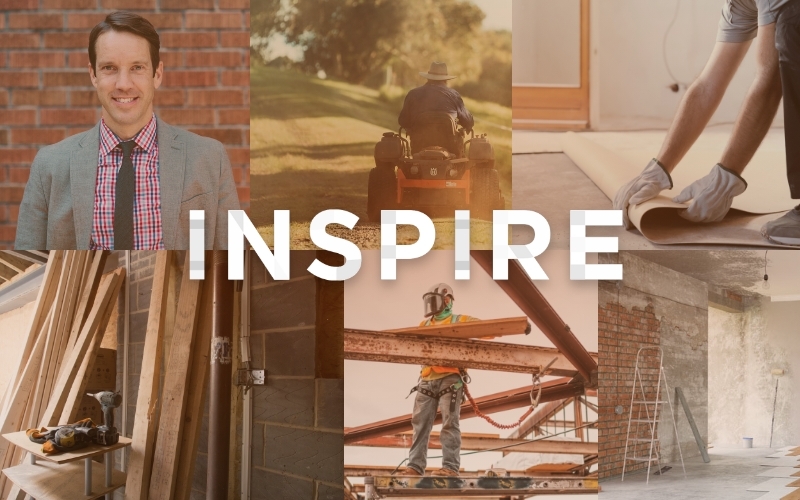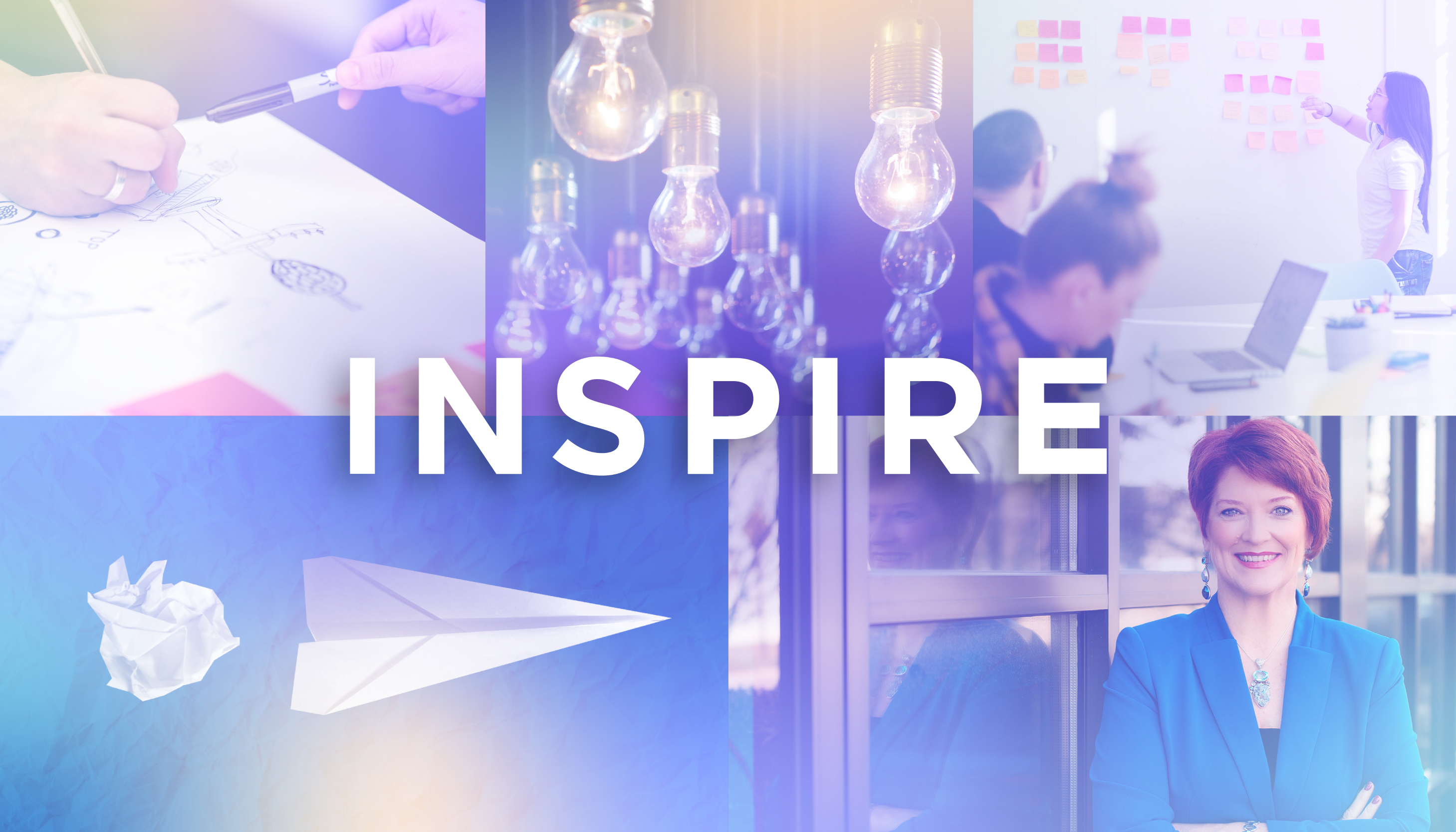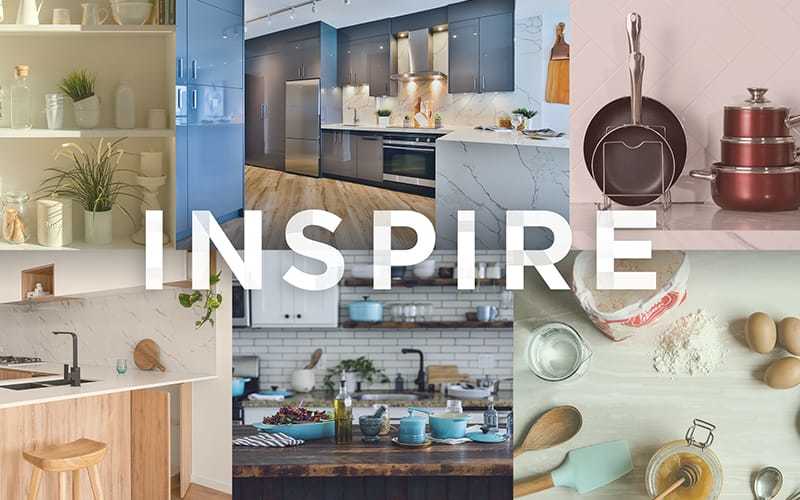Community
Inspiration
Launched in 2018 to tell stories behind the talent at Wray Ward, today, the Inspire series captures intimate portraits of industry influencers and thought leaders whose ideas and passion are fueling innovation in the home and building category.
Now, meet Demi Knight Clark, a self-professed spitfire and energy ball who envisions a world where women and men are equal in all trades. The only woman in the room for much of her career (mostly in residential construction), Demi is a passionate advocate for equal representation, from boardrooms to sports.
This real-life superwoman stays busy, from her day job making homeownership simpler, faster and more accessible to all Americans, to her work with She Built This City, the nonprofit organization she founded in 2019. Demi is also an Ironman triathlete, marathon runner and mountain climber. In fact, scaling mountains (literally — she reached the 19,341-foot summit of Africa’s Mount Kilimanjaro in 2019) and completing Yale School of Management’s Global Executive Leadership Program became the catalyst for She Built This City.
These experiences gave Demi the final push she needed to set her sights on a new summit: After years of observing unfair and unequal treatment of women in fields such as construction, automotive, engineering, equipment operation and entrepreneurship, she finally said, “No more excuses.”
Now, just two years later, She Built This City is making solid progress in its work to increase the number of women in the trades, pledging for 50/50 representation by 2030. Demi and her team are also committed to addressing problems such as unequal pay, unconscious bias, lack of support for women in the workplace and other barriers to full equity in the trades.
As a female leader in a creative industry less than 60 years removed from the height of the “Mad Men” era, I fully share Demi’s commitment to helping young women and aspiring leaders grow their skills and build a successful career. Organizations like She Built This City are critical to that cause.
I was grateful for the chance to sit down with this inspiring woman. Read on for our conversation about learning from strong role models, taking risks and channeling a passion to change the world.
JOA: You’re a self-professed “spitfire” and energy ball who envisions a world where women and men are equal in all trades. Can you tell us about your passion for equal representation?
DKC: It started with my grandmother, a World War II test pilot. Once a model in New York City, she was supposed to do “the thing” of the 1940s: Get married. Have babies. Manage the house.
She was on a train bound for Alexandria (her hometown) when, on a whim, she stopped at a Marine Corps recruiting station and asked, “Will you take women?” That’s how my grandmother landed in a female pilot program since chronicled in several books.
That takes moxie. It takes gumption. My generation benefited from people like my grandmother, and she instilled that passion in me at a young age. Today, I’m proud to say that my 15- and 17-year-old daughters have grown up in a less gender-centric school system and world. My daughters feel equal to boys.
For most of my 20-year construction career, it was easy for me to say, “I like to compete with boys.” But when I got into management, I felt lonely. And I started to see the reality: Women are just 9% of the trade workforce, and even that skews high due to sales roles. When you’re talking about real trades such as roofing and plumbing, women have just 3% of those roles.
JOA: My two daughters grew up in a family where their father stayed home. Meanwhile, they watched their mother work her way up from female art director and creative director to agency owner, hopefully carving a path for women in the creative industry. So they get it, too.
DKC: It’s so important.
(She Built This City) is a different kind of nonprofit. We focus on disruptive strategies, and we don’t have wounded bird syndrome.
When COVID-19 hit, we saw about 2 million women get out of the workforce. We were moving in the wrong direction. (Underrepresentation) is a big problem, and I’m glad it’s being addressed not just within the nonprofit ecosystem, but at major corporations.
Any business that employs people needs to think about what its workforce is looking for. What is the company’s pipeline for recruiting? Are they doing all of the right things to create opportunities?
JOA: Not only are you exposing young girls to opportunities, but you’re providing education and opening doors for women to consider new things, even as many people are reassessing their lives and how they want to take on the world. In this environment, so many people have a chance to change direction and do something new. You’re sitting in a wonderful spot.
Wray Ward serves the home and building category, including a lot of manufacturers. Many manufacturers’ audiences are trades. And we rarely see women in those roles.
I once said, I’m going to open a business called Contract Hers. Imagine what women could do in these roles!
DKC: I worked for the largest homebuilder in the U.S., and our women superintendents knocked it out of the park. I thought, if I could help even five to 10 women rise above their current position each year, that would make a huge difference.
She Built This City is careful to look at both ends of the funnel. We create apprenticeships, but we also look at opportunities with potential for immediate impact. Some of our women plumbers are about to enter the workforce. Some are women of color. They can change the family dynamic.
The 2030 trades, meanwhile, represent the top part of the funnel. These are the girls whose futures we can impact for the better. But for the next generation, we have to make the trades — I hate this word — sexy. I get that, because I have teenage daughters making career decisions. We have to talk about the entrepreneurial aspects. We have to make it relevant for them.
Now, the hammers and nails part of the trades won’t go away. But it isn’t the full picture. This effort also isn’t the 1980s in Detroit. It isn’t about firing people on the assembly line and replacing them with robots. It’s about giving an 18-year-old kid a chance to start an apprenticeship and come out with a well-paying job as an engineer.
Technology is the scalable thing we can teach.
JOA: It’s about changing perception of the trades. These are GOOD jobs.
DKC: And sustainable! They won’t be eradicated — there will always be demand for tech-heavy skill sets.
JOA: Have you seen nodding of heads and agreement from technical colleges and trade schools? Do they understand this huge opportunity? Do they see the same bright future for women and young girls?
DKC: They do great work, but yes and no. They see the tip of the iceberg, but they don’t necessarily have the structure to deal with the iceberg.
Trade schools need to know they’re not irrelevant. They may just need to evolve their curriculums. I love the Google Career Certificates, because Google figured out how to make those skills sexy. We have to do the same thing for the trades. Lose the antiquated language. Change the narrative. Break down silos. Update the recruiting tools used in high schools.
I should also mention we’re finding as many opportunities to support boys or those who identify as male. There’s a whole generation that lost those trade skills because they didn’t grow up with a parent that modeled them.
JOA: I’ll bet communication to parents is another hurdle. They have to be on board.
DKC: Absolutely.
JOA: She Built This City is still a young organization. What is your proudest accomplishment to date?
DKC: Honestly, the fact that we have people asking about us. If we’ve empowered one girl or woman to think, do and act for herself in terms of fixing something, hanging drapes or (in a perfect world) starting her own business, I’ve done my job in founding the organization. That impact will have a butterfly effect.
JOA: We each work in an industry where a lot of the leadership roles are filled by men (you’ve said you were the “only woman in the room” for much of your career). How did you channel your talents and passion to become a female business leader?
DKC: I had a boss who used to tell me all the time, “Demi, if you want the next job and you want to last, you have to do two things: One, dig the ditch, and two, be the ‘Got it!’ girl. Take the jobs no one wants. You’ll learn a new skill, and you’ll prove that you’re invaluable to an organization.”
Everyone wants flashy jobs with great titles and accolades, but what about the necessary jobs that solve the problems directly? That’s what gets you promoted organically and honestly.
Just say, “Got it!” with no questions and with a good attitude. You’ll become invaluable.
JOA: Let’s talk about early role models. Like you, I looked up to my dad as a mentor. Can you share how your father inspired you?
DKC: My father has a Type A personality, and I’m cut from his cloth. A nuclear and mechanical engineer, he has multiple degrees from West Point. He always said, whatever you want to be, go do it. I took influences like my dad and grandmother for granted. I never knew other people had a different experience.
JOA: You come from a family of overachievers.
DKC: My kids say that all the time.
Honestly, parental influence is huge. At She Built This City, we see just as many parents intimidated by trades. They weren’t taught. They don’t have a workshop. Even hanging drapes or fans is a challenge. Kids are missing that familial influence that helps normalize the trades.
JOA: My father was a lifetime IBMer with an engineering degree. My older sister was a business major. When I said I wanted to be an art major, my dad was supportive but nervous. Somehow, I managed to run a business.
My dad was a pillar in the community, and that had a great influence on me. It taught me the importance of giving back.
DKC: Representation matters. When we see something — when we have positive models — we’re more likely to think, “I can do that.”
JOA: If a young woman is on the fence about following her passion, what advice would you share?
DKC: I would say jump off the cliff. Don’t overthink it. The how will come. It’s the why that will absolutely determine your life. Every time I’ve made a decision driven by the heart, it was the right decision.
Make all the mistakes when you’re young. I took myself too seriously in my 20s. I thought I had to be perfect. I wish someone had just told me to fail a lot.
Take chances. Let the how figure itself out. Those little whispers are divine intervention.
JOA: My advice is the same: Run after it as hard as you can. One of two things will happen — you’ll succeed or you’ll fail — and both are valuable.
I love what you said, Demi. Fail a lot when you’re young. Forge a path. Do something you love. Do what’s important.
DKC: This next generation will really test us. We love to talk about how Gen Z job-hops. If the job lacks true purpose, or if it has no sense of social justice, they ask, “Why stay?” Otherwise, they’ll feel like they’re wasting their life with that 9-to-5. I don’t blame them.
JOA: At Wray Ward, internship candidates are asking us about EmpoWWer, our corporate social responsibility program.
DKC: They’re interviewing you!
JOA: It’s our responsibility to make sure we support our community in an authentic way. A lot of people care deeply about what we’re doing. We hope that our commitment to doing good through EmpoWWer will keep existing employees and prospects engaged and inspired and introduce them to the nonprofits in Charlotte that are doing great work. This summer, our interns got to work on repositioning and branding one of those nonprofits. It was awesome.
DKC: I wish I had done that in my internships. Looking back, I would be more assertive. Provide suggestions that matter. That’s what will push us to be better.
JOA: Are there any trade groups or corporations that you believe are leading the way when it comes to opportunities for women and underserved communities?
DKC: I would say Lowe’s, hands down. Not just because they’re in our backyard (in the Charlotte region). They’re so community-facing. They love to invest in Charlotte. But they walk the walk across their global footprint, starting with (CEO) Marvin Ellison. Soup to nuts, internally and externally, they eat, breathe and live equity. They’re also She Built This City’s primary funder. We wouldn’t be here without Lowe’s.
Beyond Lowe’s, I’d say there are about 15 entities that are really strong. After that, it’s problematic.
I would challenge corporations to stop asking for three years of financials before supporting a cause. Take some chances. Put your money where your mouth is. Whether you give to a nonprofit or enact programs within your company, commit to change.
JOA: It’s great to hear that Lowe’s has such a big commitment to supporting this work.
DKC: I want a lot of trade organizations to take a tune from what Lowe’s is doing.
JOA: Think about our city. Charlotte is a city that doesn’t like to fail. Coming out of a pandemic, being innovative in testing and learning, putting dollars into startups — I’m totally with you. We have to be flexible and innovative in charging forward. Of course, innovating is a little like risk-taking.
On that note, why is it so important to take risks?
DKC: Personal answer: COVID-19 taught us that life is short. We need to constantly be reminded of that. The pandemic led us to make some tough value decisions. How to improve mental health. What matters most. What to do with the rest of your life. How much are you willing to put on the line? Now may be the best time for people to take risks.
Let’s talk about safety nets. If it’s a big enough risk, you don’t have a net. What are the risks that are so important, you’re still willing to try? That’s one way the next generation is starting to define itself. They’re not afraid to take risks. They’ll help us become a risk-centric and risk-aggressive culture. I’m that Gen Xer in the middle. Let it go and see where it takes you.
If you believe something in your heart, you have to do it. Silence or violence.
JOA: When I think about some of the risks I’ve taken, they didn’t seem like risks because I believed in them — because I was passionate about them. Like building Wray Ward’s new office during a pandemic.
Demi, I agree. This younger generation fears not.
DKC: How do you encourage young people to have a side hustle that is also their passion? That can actually make them better at their day job? These are the questions we’ve needed to ask and the conversations we’ve needed to have for 20 years. I don’t like that it took a pandemic to make us think about it.
JOA: How can we continue to make sure women have the means to overcome traditional barriers and achieve full equity?
DKC: That’s a loaded question, and it goes beyond women. A lot of the population are minorities. Culturally, we just need to change. Remember, we’re experiencing a shift of power and percentages. White males once made up the majority in the U.S., and that’s teetering.
It’s about asking, at what point can we add equity into the conversation? It has to start in schools. There’s work to be done, but it shouldn’t be up to them to have all of the answers. They need help.
Later, within the workforce, we need to continue to do better. See the gaps and understand what’s needed — colleges, workforce development agencies and more.
The problems today aren’t for lack of companies wanting to hire more women. They just can’t find them.
JOA: So, what’s next for She Built This City? For you?
DKC: It’s an open book. I don’t like to have all the answers, because hopefully I’ll have a long life like my grandmother. And She Built This City has such a bright future.
I think back to climbing Mount Kilimanjaro, where I was surrounded by inspirational women. You don’t scale a 20,000-foot mountain without a reason. You’re overcoming something. Soon, I’ll go back to Africa with She Built This City, hopefully to help start a 3D print facility for women.
Personally, I want to get more involved on the policy side. We could scale our work to 30 cities, and the inequities we’re facing would still be a big problem. If we focus on policy change, we can make an even bigger difference.


